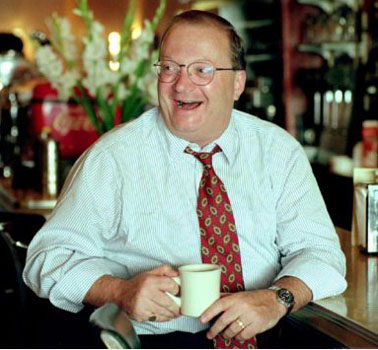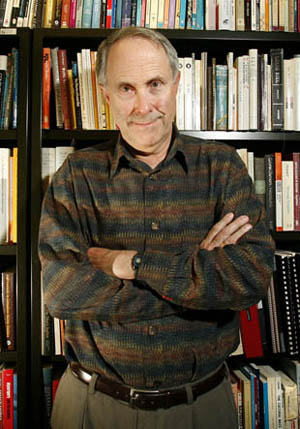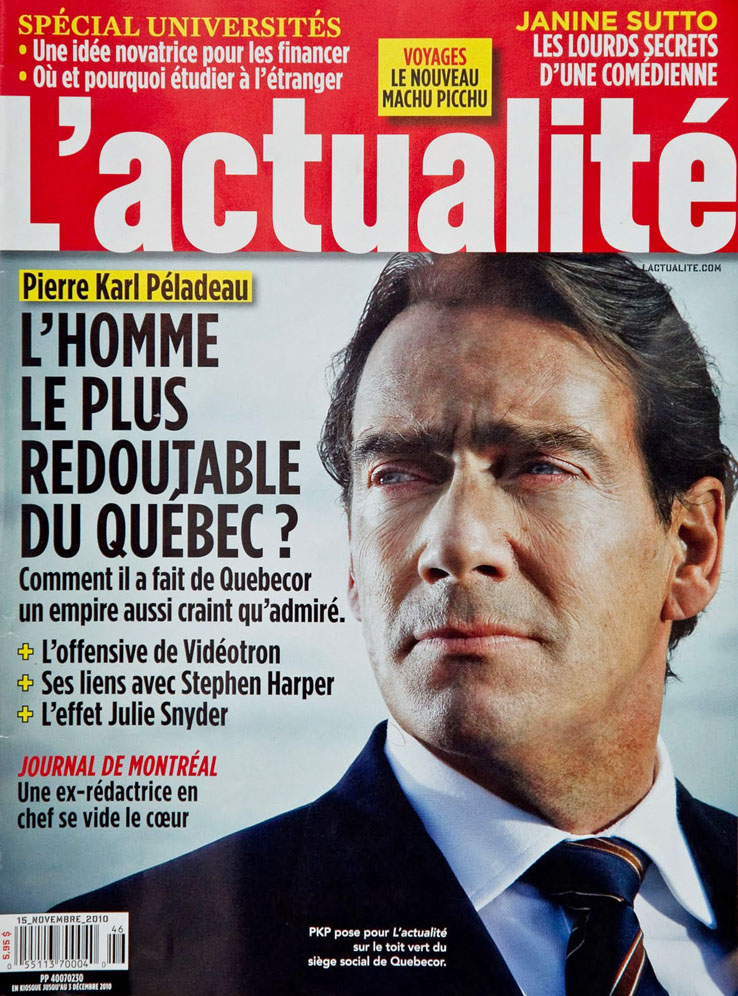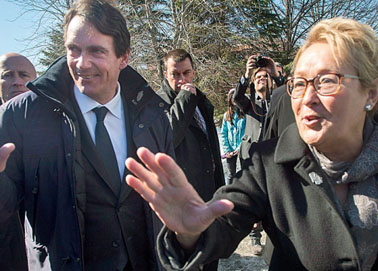Tom Flanagan and Pierre Karl Péladeau loom as Quebec campaign starts up
Mar 11th, 2014 | By Citizen X | Category: In Brief
Hugh Segal, campaigning for the federal Progressive Conservative party leadership in 1998. DICK LOEK / TORONTO STAR FILE PHOTO.
I want to hang in for a moment longer with my colleague Frank Bunting’s allusion to Hugh Segal’s wisdom on Quebec last week.
The Quebec provincial election campaign of 2014 has only just begun. But already I feel I have to keep trying hard to remember what Senator Segal said early in 2012 : “If, as Parliament has affirmed in November, 2006, Quebecois are a ‘nation’ within a united Canada, then it is time we all asked ourselves how the genuine benefits of a post nation-state ‘new multinational’ Canada can best be achieved-in social, economic and geopolitical terms. Quebec’s capacity to energize this debate and search should be celebrated. “
Even in the sister province of Ontario (a Bill Davis 1970s/early 1980s locution), it seems harder to celebrate Quebec’s capacity to energize Canadian public life when Pauline Marois and/or her new high-rolling business community recruit Pierre Karl Péladeau are talking. Which they are of course professionally bound to do a lot more of during the present Quebec election campaign – until the vote finally takes place on April 7.

University of Calgary professor of political science Tom Flanagan in his University office in Calgary. Todd Korol for National Post.
Yet, as hard as full-blown “celebration” remains, the still very new Quebec 2014 campaign does almost seem to include some sudden vague revival of Quebec’s ancient but not-much-evident-lately capacity to make Canada and Canadian politics at least seem more interesting. The texts I’d offer as evidence are two items in the Globe and Mail yesterday, Monday, March 10 :
(1) Former Harper advisor Tom Flanagan writes about “Another round of coalition bogeyman?” Mr. Flanagan is without doubt a smart guy. His apparent recent liberation from too slavish connections to PM Harper sometimes seems to have made him even smarter, or at any rate more honest.
He speculates that “ if the Parti Québécois wins the Quebec provincial election and starts planning another referendum on separation. Mr. [federal NDP leader Tom] Mulcair’s repudiation of the Clarity Act and his position that a simple majority in a Quebec referendum is enough to enable separation might be made to look quite scary.”
* * * *

Les chefs Thomas Mulcair et Justin Trudeau se serrent la main lors du 33e défilé de la Fierté gaie de Toronto, juin 2013. PHOTO: REUTERS.
Mr. Flanagan begins “Another round of coalition bogeyman?” with : “Before Justin Trudeau won the Liberal leadership, New Democratic Party Leader Thomas Mulcair ruled out any co-operation with the Liberals. But now he says he’s open to postelection co-operation.” People like me have found this encouraging. And until the very end of Tom Flanagan’s coalition-bogeyman article I had started to marvel at just how much of a smart guy Mr. Flanagan is/was or used-to-be.
Alas, his last paragraph finally makes him sound like just another smart guy from Alberta who doesn’t really get Quebec, even in the limited way that we in Ontario (sometimes) do (sort of) : “Canada may be in for a wild ride. The next election, instead of focusing on Trudeauvian charisma and Conservative tax cuts, may be all about coalitions and national unity. How’s this for a ballot question: Who can best protect Canada’s future — the flinty-eyed Mr. Harper, or the amiable Mr. Trudeau depending on Mr. Mulcair to stay in power?”
One thing Tom Flanagan, as smart as he is, doesn’t seem to appreciate is that in some (even many?) provinces outside Alberta, the most obvious answer to his ballot question is clearly “ the amiable Mr. Trudeau depending on Mr. Mulcair to stay in power.” Just as we were lucky in 1980 that the amiable Mr. Trudeau’s father was in office (as was his legatee Jean Chretien in 1995)!
Another thing is that, even if the macho aggressive approach to these matters ever actually worked (after the defeat of the Spanish Armada in 1588?), Mr. Harper has a little too much of a gentleman’s-fit physique to seriously qualify as “flinty-eyed.”
(2) “How Péladeau’s PQ bombshell will lead to aftershocks in Ottawa” … Konrad Yakabuski’s March 10 Globe article here has certainly given me a (slightly) better idea of just what’s going on in Quebec politics at the moment. Here are five sample paragraphs :

This November 2010 article on business leader Pierre Karl Peladeau in the Quebec media stressed connections with Stephen Harper, not support for Quebec sovereignty!
“For Mr. Mulroney, the architect of the failed Meech Lake constitutional accord that aimed to quash the sovereigntist movement by recognizing Quebec as a distinct society, it marks the second time that a key protégé has joined the separatist cause. The former prime minister has mentored Mr. [Pierre Karl] Péladeau almost since the latter took the reins at Quebecor after the death of his father, Pierre Péladeau, in 1997 …
“The 52-year-old Mr. Péladeau’s conversion to the sovereigntist cause has been years in the making. His father flirted with separatism, but the son considered politics beneath him and kept his distance from it until recently. A philosophy major, he studied in France and that country has served as his reference in most political matters. He also lived in Paris while running Quebecor’s European printing business in the 1990s …

This past January Pierre Karl Peladeau and Quebec TV host Julie Snyder announced that their 12-year relationship was over. In the waning days of the 2012 Quebec election, Julie Snyder hosted a Parti Quebecois rally where she heaped praise on Pauline Marois. She has also backed Ms Marois’s controversial Quebec values charter.
“Quebecor’s [2000] takeover of cable operator Groupe Vidéotron in a massive deal backstopped by the powerful Caisse de dépôt et placement du Québec … marked a strategic shift … Quebecor … suddenly refocused on its home province, after buying the English-language Sun newspaper chain and turning Quebecor World into the globe’s largest commercial printer … Indeed, except for the Sun chain and its sister news channel, Quebecor’s business activities are now entirely concentrated in Quebec. (Vidéotron recently purchased mobile spectrum in Ontario and Western Canada, however, signalling a potential expansion.) …
“Still, since Quebecor World went bankrupt several years ago, Quebecor has lost its global reach. The unravelling of the printing business in 2008 had a profound impact on Mr. Péladeau, and marked his souring on the Canadian business establishment …
“Royal Bank of Canada led a syndicate of banks that refused to refinance Quebecor World’s debt … ‘He felt English Canada rejected him,’ said a source familiar with the negotiations between Quebecor and Royal Bank”.

In March 2014 Parti Quebecois Leader Pauline Marois and new PQ candidate Pierre Karl Peladeau wave to supporters in Saint Jerome, Que., where the media mogul is planning to run. (Canadian Press).
So … confirmed Canadians might read all this as evidence that the Quebec sovereigntist movement is currently being boosted by a Quebec businessman who is just looking for revenge against the Royal Bank of Canada. As rational as the passion for any revenge against any of the Canadian chartered banks may be (and on the part of many among us outside Quebec as well, no doubt), is this really a good enough reason to destroy Canada? (Which is what, I agree again with Frank Bunting, any successful “independent” Quebec would finally do.)
Meanwhile, according to a March 10 Reuters article by Randall Palmer : “An Internet survey by the polling firm CROP released on Sunday night puts support for the ruling Parti Quebecois (PQ), which wants Quebec to separate from Canada, at 36 percent. This is the same level as the pro-Canada Liberal Party of Quebec, with the smaller Coalition Avenir Quebec (CAQ) at 17 percent …Â The same CROP survey showed 61 percent would vote no in a referendum on independence, with 39 percent yes.” And for parallel good or at least wishful news from anglophone Montreal, see “Youth bored by sovereignty, even with Peladeau’s support.”

